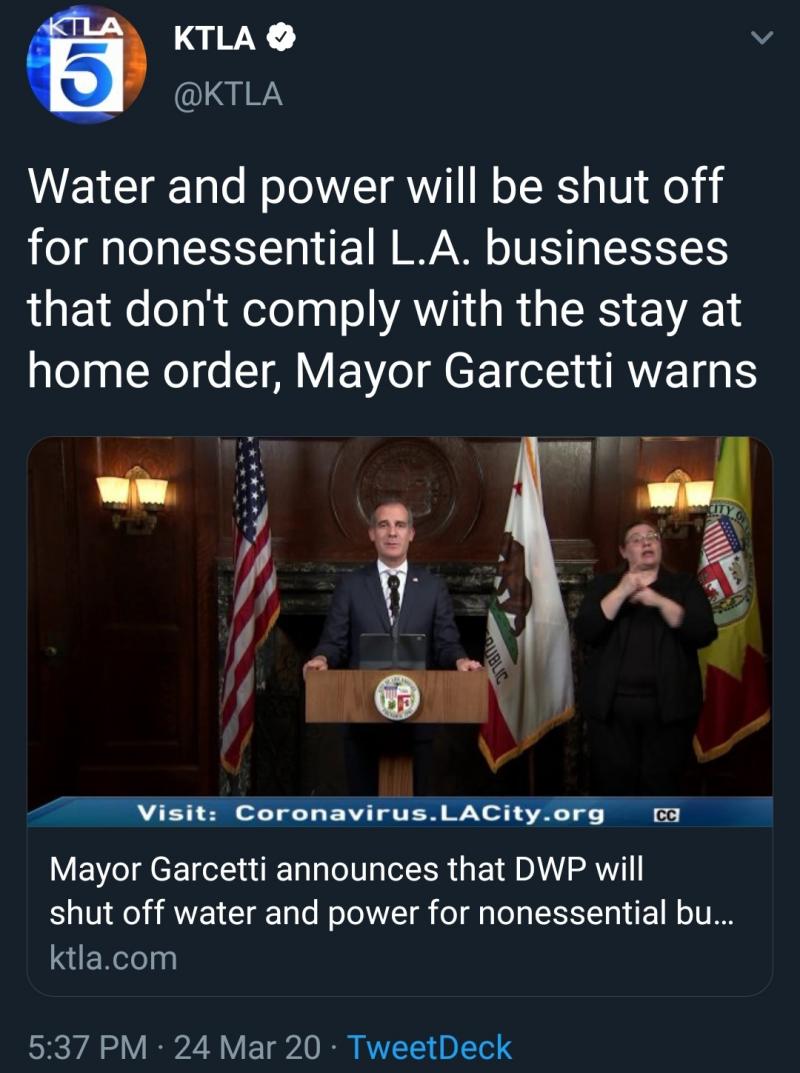-
Posts
67,755 -
Joined
-
Last visited
Content Type
Gallery
Profiles
Forums
Events
Posts posted by B-Man
-
-
-
-
-
House Democrats couldn't put more than 115 seconds into their work day today?
You actually think the American Citizens are worth two whole minutes of the Congress' time?....
.
-
 1
1
-
-
After Nancy Pelosi and the Democrats wasted a great deal of time trying to get pet projects and funding unrelated to the coronavirus outbreak or assisting workers in the first stimulus package, a second $2 trillion bill is on the verge of being passed with bipartisan support.
-
 1
1
-
 1
1
-
-
-
We’re Not Going to Re-Open the Country All at Once
Joe CunninghamOn Tuesday, Donald Trump said he would like to see the country opened back up by Easter. Many people freaked out, waving their arms and running around screaming that the President is going to kill us all (again). He didn’t establish a hard date here. He simply said that is what he would like to see.
It is not his policy to just return the country to normal on a whim. Clearly, there is a goal and the government is looking into how to meet that goal. There is, contrary to what many in the media and on the Left might tell you, an actual plan here. Those whose hatred of the President is so great that they would blame him for someone drinking fish tank cleaner are not going to let you know that the White House has actually announced its plan. Instead, they’ll continue to question whether or not the country will be ready to be open for business at a hard date the President never actually set.
So, what is that plan?
According to the President’s own remarks, it’s to approach the problem on a region-by-region basis.
From the beginning, we have been working closely with our nation’s best scientists and medical professionals, and we will continue to do so until we have defeated the virus. Our public health experts, who are terrific, are studying the variation in the disease across the country, and we will be using data to recommend new protocols to allow local economies to cautiously resume their activity at the appropriate time.
We also have a large team working on what the next steps will be once the medical community gives a region the okay — meaning the okay to get going, to get back; let’s go to work.
Our country wasn’t built to be shut down. This is not a country that was built for this. It was not built to be shut down.
Trump is carefully trying to balance the medical and economic approach here, and based on what we’ve seen coming out of Washington D.C., it looks like the public health experts are going to break the country down by region – anywhere from Congressional-district-sized to zip code to possibly even the county level.
What this suggests is that if the federal government were to lift guidelines/recommendations, it would start by targeting the areas of the country that are clear of COVID-19 or are not showing any spread. As public health agencies report in, new areas of full containment or designated as all clear would be next up to see restrictions lifted.
This is ultimately the right approach because the entire point of our system of government is based on the idea that one size doesn’t fit all when it comes to setting policy. It is frankly ridiculous for some places of the country – particularly rural areas with absolutely no infections and very little chance of anyone infected even visiting those places – to be shut down because a shut down in those areas would kill off the entire town’s business community. Whereas bigger cities could take a shutdown and survive because many of the businesses there are larger, the smaller communities simply could not handle it.
That’s where it appears the Trump administration is headed, and it is the right direction. It is actually refreshing to see a chief executive in government get handed all the power and, in this case, not use it, instead letting the system work it out.
.
-
 2
2
-
-
-
BUREAUCRACY KILLS:
DISPLAYING ADAPTABILITY: How Ford Is Using Seat Ventilation Fans to Build Thousands of Respirators.
. -
-
There are differing viewpoints ?
.
-
 3
3
-
-
14 hours ago, B-Man said:
FTA:
Also notice this detail from a March 22 announcement from Food and Drug Administration, which suggests that one possible solution is on the bedside tables of millions of Americans.
Continuous Positive Airway Pressure (CPAP), auto-CPAP, and bilevel positive airway pressure (BiPAP or BPAP) machines typically used for treatment of sleep apnea (either in the home or facility setting) may be used to support patients with respiratory insufficiency provided appropriate monitoring (as available) and patient condition.
It’s hard to get a sense of how many CPAP machines are out there, but one manufacturer, ResMed, said in 2018 it had millions of patients. One company estimates 5 million Americans use CPAP machines.
I know we have one.
.
-
-
-
THEIR PRIORITIES WERE MADE CLEAR:
Boston Editorial: We will remember Dems’ stimulus holdup.
“And they’re only kidding themselves if they think the American people aren’t wondering how these pols went from an economic stimulus bill to voter registration.
People are paying attention, especially those who are out of a job because of coronavirus restrictions on businesses. They are desperate for those $1,000 or more checks — already earmarking them for food and vital supplies. And they will remember such brazen stunts, as much as they will remember how President Trump is handling the pandemic.”
. -
KRUISER’S MORNING BRIEF: The Latest Coronavirus Mutation — My New Ways to Hate the Media.
“As the world has descended into coronavirus panic, the scum masquerading as journalists in this country have been working overtime to plumb new depths of irresponsibility.”
. -
They...............are................crazy.
OUR RULING CLASS:
Brown professor apologizes for saying pregnant women have ‘husbands’ in coronavirus newsletter.
.
-
THEY CALLOUSLY OVERPLAYED A WEAK HAND AT A DANGEROUS TIME:
Congressional Democrats are tanking Biden’s 2020 odds.
.
-
US was more prepared for pandemic than any other country, Johns Hopkins study found
by Gregg Re
The United States was ranked the best-prepared country in the world to handle a pandemic in late 2019 by the Nuclear Threat Initiative (NTI) and the Johns Hopkins Center for Health Security (JHCHS) -- an assessment seemingly at odds with claims by Democrats that the Trump administration left the country vulnerable to the ongoing coronavirus outbreak.
The Global Health Security Index was was "developed with guidance from an international panel of experts from 13 countries, with research by the Economist Intelligence Unit" from 2018 to 2019, The Washington Post reported last year. "
USA TODAY COLUMN: 5 tips to keep you sane during the coronavirus crisis.
. -
By massively scaling up two types of tests—PCR tests that detect the active presence of virus and serology tests that detect immune system responses to being infected by the virus—population screening could identify those who are currently infected and those who have recovered and are likely not to pass along the virus to others.
Those who are currently infected could be isolated and their contacts traced so that they could quarantine themselves. Frequent large-scale testing of the uninfected would also help keep the epidemic in check by enabling them to withdraw if they subsequently contract the virus for a period of self-isolation in a timely fashion. Frontline health care providers and especially hard-hit regions should be given first priority as the testing regime begins its rapid expansion.
Those who had recovered from infection (possibly numbering ten times more than those whose symptoms drive them to seek out medical care) could help on the frontlines of the fight against COVID-19, return to work, and enjoy the pleasures of social life, e.g., dining out, meeting friends at bars, traveling, and attending performances at entertainment venues. “To make this strategy work, governments would need to involve employers, social organizations, schools and large retailers to conduct tests and provide time-stamped certifications,” propose the three researchers.
To ramp up both kinds of testing, the researchers urge that every laboratory capable of running PCR tests be pressed into service recruiting technicians, graduate students, and scientists to run the machines. Even better, Mesa Biotech just announced today that it has received Emergency Use Authorization from the Food and Drug Administration (FDA) to roll out its point-of-use 30-minute PCR test for the virus. Other companies should be encouraged to provide such tests.
As I also argued last week, the researchers argue that widespread deployment of serology tests for the presence of antibodies to coronavirus needs to be prioritized. This would identify people who had recovered and could safely go back to life outside of lockdown.
Over at the Wall Street Journal, the perspicacious former FDA commissioner Scott Gottlieb also recommends massively scaling up serological surveillance. When population screening reveals that “a sizable portion of a local community has some protection, authorities can be more confident in relying on less invasive measures. Once deployed, serological tests are cheap, straightforward, and easy to scale.”
Several companies have already developed such tests.
Faster, please.
..-
 3
3
-
-
FDA authorizes hand-held COVID-19 diagnostic test.
“Mesa Biotech’s Accula device is designed to enable near-patient testing, available anywhere outside of the laboratory, with results in about 30 minutes.”
Also: FDA will allow doctors to treat critically ill coronavirus patients with blood from survivors.
.-
 1
1
-
 1
1
-
-
-
-
9 minutes ago, Alphadawg7 said:
If we don't slow the spread down, the death toll can be in the millions, not 12,000. That is the issue. No one wants to see the economy crumble, but at the end of the day, life matters more than the Dow and we need to prioritize slowing this down above all elseI appreciate that, but the economy "crumbling" is not something that can be dismissed as the lesser of two evils.
Talk about millions being affected, you are talking about hundreds of millions lives being changed..............not "the Dow"
That is why the subject of this thread is so important.
.
-
 2
2
-
 1
1
-









The Thread For Greg's Stashes
in Politics, Polls, and Pundits
Posted